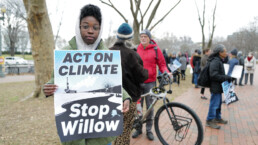Environmentalists and some Alaskan Native communities had opposed the plan over climate, wildlife and food-shortage fears.
by Oliver Milman, Nina Lakhani, and Maanvi Singh, The Guardian
The Biden administration has approved a controversial $8bn (£6bn) drilling project on Alaska’s North Slope, which has drawn fierce opposition from environmentalists and some Alaska Native communities, who say it will speed up the climate breakdown and undermine food security.
The ConocoPhillips Willow project will be one of the largest of its kind on US soil, involving drilling for oil and gas at three sites for multiple decades on the 23m-acre National Petroleum Reserve which is owned by the federal government and is the largest tract of undisturbed public land in the US.

It will produce an estimated 576m barrels of oil over 30 years, with a peak of 180,000 barrels of crude a day. This extraction, which ConocoPhillips has said may, ironically, involve refreezing the rapidly thawing Arctic permafrost to stabilize drilling equipment, would create one of the largest “carbon bombs” on US soil, potentially producing more than twice as many emissions than all renewable energy projects on public lands by 2030 would cut combined.
Recent Posts
‘Unconstitutional. Unethical. Authoritarian.’ ICE Bars Millions Of Immigrants From Bond Hearings
July 18, 2025
Take Action Now One watchdog said the new policy “seems like a blatant attempt to stop them from exercising their right to due process.”……
Americans Are Not Nearly Alarmed Enough About Climate Change
July 18, 2025
Take Action Now Americans still don’t comprehend how imminent, dangerous, and far-reaching the threat is—and journalists are partly to blame.By…
The IRS Is Building A Vast System To Share Millions Of Taxpayers’ Data With ICE
July 17, 2025
Take Action Now ProPublica has obtained the blueprint for the Trump administration’s unprecedented plan to turn over IRS records to Homeland Security…
Israel’s Sudden Assault On Syria Is Unchecked Aggression
July 17, 2025
Take Action Now Jerusalem is bombing Damascus and threatening al-Sharaa’s rule, while Washington was hoping to help the nascent government on…




